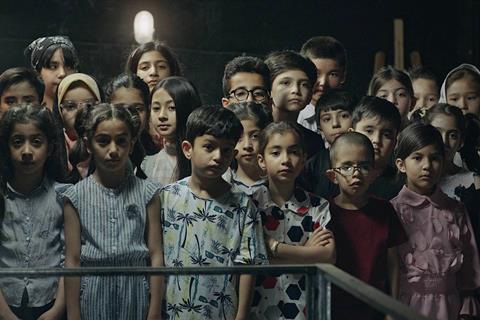Real Iranian children discuss love and hope in the British-Iranian director’s Busan Competition feature

Dir/scr: Hassan Nazer. Iran/UK. 2025. 80 mins.
Without Permission marks a return to Iran for UK-based Iranian filmmaker Hassan Nazer – return from exile being a primary theme in this story of an Iranian émigré director (Behrouz Sebt Rasoul) going back to his country to make a film. Confronting problems of storytelling in the face of sociopolitical repression, it follows in the footsteps of fellow Iranian film-makers such as Abbas Kiarostami, Mohsen Makhmalbaf and Jafar Panahi, who also use complex narrative strategies to circumvent taboos and restrictions.
Does not quite break fresh ground but addresses questions of freedom
Paying evident homage to its precursors, Without Permission does not quite break fresh ground but addresses questions of freedom as they relate to new political pressures in Iran, and to a new generation. Competing in Busan, the film should attract attention across the range of niche outlets, following the high profile of Nazer’s 2022 feature Winners.
We first meet the fictional filmmaker, known only as the Director, driving through a starkly beautiful rocky terrain with a young woman, his production assistant (Setareh Fahari). The imposing vistas, with the car in the far distance, echo images from Kiarostami (notably The Wind Will Carry Us), to whom the film is dedicated.
The destination is an unspecified locale with a darkened cellar space, where the Director films interviews with some 20 children whose responses are real and unscripted. The children are of various ages, ranging roughly from six to early adolescence; the questions he asks are generally about their dreams for the future, specifically about how they see love, and relationships between the sexes. A recurrent interlude features a young boy and girl, both dressed in white as if for a wedding, in a field of yellow flowers – an image with an unavoidable ring of kitsch preciosity.
But any romantic idealism implicit in this image or in the interviews contrasts sharply with the impression given of actual gender politics in Iran. A separate strand involves a man (Mehdi Mehri) complaining to a judge off-screen about the state of his marriage. Later, the man and his wife both appear before this authority, the woman consistently silenced until she succeeds in talking to a female judge.
Other interludes involve the playing of traditional instruments around a cave mouth, and it takes a while for the film’s various strands to knit together. Mostly, however, the film’s substance lies in the interviews with the children – all appearing, a caption notes, with agreement from their parents.
Within the film’s fictional structure, the children represent an irreducible core of authenticity; it’s hard not to be charmed and often surprised by their responses, some of which relate to their willingness or otherwise to act in brief romantic dialogues staged by the Director. Some charismatic personalities emerge – including one young girl who firmly attests to strict Islamic principles and another older girl who is sharp-witted, articulate and ebulliently in her element before the camera.
But the questioning itself is less convincing as delivered by Rasoul (himself a director, his films including 2023’s Melody), whose insistent, incantatory monotone makes him seem more an inquisitor figure than an empathetic interlocutor likely to put the kids at ease. And, while social realities in Iran clearly limit the kinds of questions it is possible to ask, there seems to be something coyly uncomfortable about the emphasis on romance – as if fond adult fantasies about children’s aspirations are being imposed on these kids, rather than their being encouraged to reveal what they really care about. Furthermore, the rapid editing of the children’s responses does not allow any one subject or train of thought to yield real insight into either their personalities or opinions.
The film does, however, take on a greater urgency in its final third, as the Director’s project encounters serious obstacles, and we at last discover the connection between the shoot and the unhappy married couple.
Without Permission has force as a polemical intervention by Nazer, explicitly addressing the necessity and the danger of making films surreptitiously in Iran; a caption notes that crew members’ names are withheld for their safety, given their participation in a production not authorised by Iran’s Ministry of Culture. The film may be inconsistent in its texture, and frustrating in the insights it yields as a generational portrait – but its urgency and its risk-taking cannot be faulted.
Production company: DreamLab Films
International sales: DreamLab Films, nasrine@dreamlabfilms.com
Producer: Hassan Nazer
Main cast: Behrouz Sebt Rasoul, Setareh Fakhari, Mehdi Mehri, Reza Heidari























